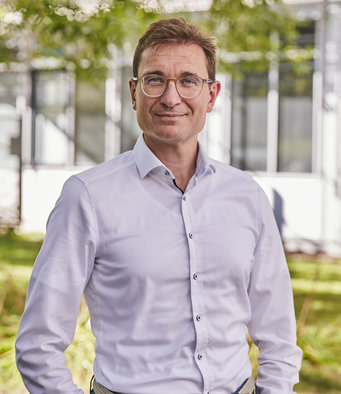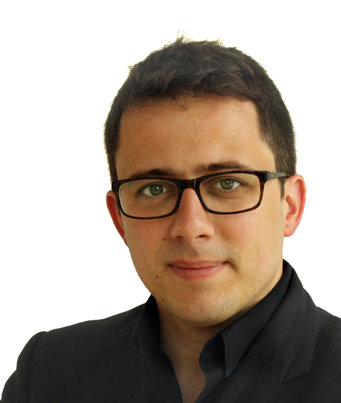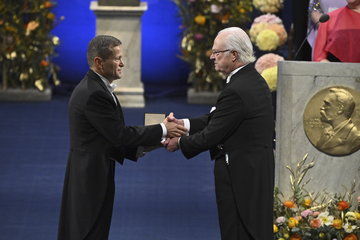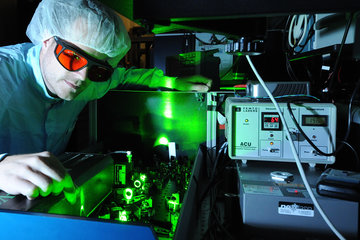Leibniz Prizes for two Max Planck scientists
Tobias Erb and Moritz Helmstaedter are honoured with the most important German research prize
The Gottfried Wilhelm Leibniz Prize, which comes with prize money of 2.5 million euros each, has been awarded annually by the German Research Foundation (DFG) since 1986. A total of 445 nominees have received the prize to date, including 371 male and 74 female scientists. The award ceremony will take place on 13 March 2024 in Berlin.
A portrait of the two Max Planck scientists:

Tobias Erb conducts research at the Max Planck Institute for Terrestrial Microbiology in Marburg. His focus is on researching the metabolic pathways of microorganisms, especially those involved in the conversion of the greenhouse gas carbon dioxide (CO2). At the interface between molecular biology, biochemistry and synthetic biology, he investigates the structure and function of microbial biocatalysts (enzymes), modifies their properties using synthetic biology methods and assembles metabolic pathways that have not arisen in natural evolution. Tobias Erb utilises these metabolic pathways in natural and artificial cells. This innovative, interdisciplinary research opens up new approaches for the development of technologies to tackle the climate crisis.
Microorganisms use sunlight or hydrogen to fix CO2 in the form of organic compounds. This enables them to utilise the problematic greenhouse gas CO2 as a source of carbon. With Tobias Erb's synthetic metabolic pathways, CO2 can be extracted from the air in a similar way - but even more efficiently than in nature - and fed into material cycles. He and his team recently succeeded in constructing an artificial chloroplast and coupling electrical current directly to metabolic conversions in order to produce the biochemical energy carrier ATP. This could be used to produce valuable materials from simple carbon compounds in a sustainable way. Tobias Erb's research thus opens up far-reaching possibilities for the development of sustainable processes in biotechnology and the capture of CO2 from the atmosphere.
Tobias Erb received his doctorate in microbiology from the University of Freiburg in 2009. After research stays in the USA and Switzerland, he became Head of the Department of Biochemistry and Synthetic Metabolism in 2014 and Director at the Max Planck Institute for Terrestrial Microbiology in 2017. He has also been a professor at the Philipps University of Marburg since 2022.

Moritz Helmstaedter is being awarded the Leibniz Prize for his pioneering work in the field of neuroscience, which has led to a fundamentally new understanding of the three-dimensional organisation and function of mammalian brain circuits. Helmstaedter was able to develop instruments and technologies that allow systematic and at the same time high-resolution access to the densely packed neuronal networks in the brain.
He is thus one of the founders of the field of connectomics, which reveals the basic principles of brain organisation from the reconstruction of thousands of neurons and their synaptic connections. His analyses of a dense local connectome of more than 200,000 synapses disproved the assumptions about the functioning of neuronal connectivity that had been valid for decades; as a result of his work, science now assumes that the individual synapses are connected with high precision. To reach this conclusion, Helmstaedter had to solve a number of methodological problems, such as how to prepare large tissue samples, including entire brains, in order to precisely record the neuron population. This has also enabled him to answer questions about the fundamental differences between the human brain and the brains of other mammalian species.
Moritz Helmstaedter has been Director at the Max Planck Institute for Brain Research in Frankfurt am Main since 2014. Since 2016, he has also held the position of Associate Professor for Neuronal Networks at Radboud University Nijmegen in the Netherlands. He had previously turned down appointments at the Janelia Research Campus in Virginia (USA) and ETH Zurich. The trained physicist and qualified doctor completed his doctorate at the Max Planck Institute for Medical Research in Heidelberg.
Two female Leibniz Prize winners and ten male Leibniz Prize winners have also received the Nobel Prize after being honoured with the most important research prize in Germany: 1988 Hartmut Michel (Chemistry), 1991 Erwin Neher and Bert Sakmann (both Medicine), 1995 Christiane Nüsslein-Volhard (Medicine), 2005 Theodor W. Hänsch (Physics), 2007 Gerhard Ertl (Chemistry), 2014 Stefan W. Hell (Chemistry), 2020 Emmanuelle Charpentier (Chemistry) and Reinhard Genzel (Physics), 2021 Benjamin List (Chemistry), 2022 Svante Pääbo (Medicine) and 2023 Ferenc Krausz (Physics). All the honourees are Max Planck scientists.













